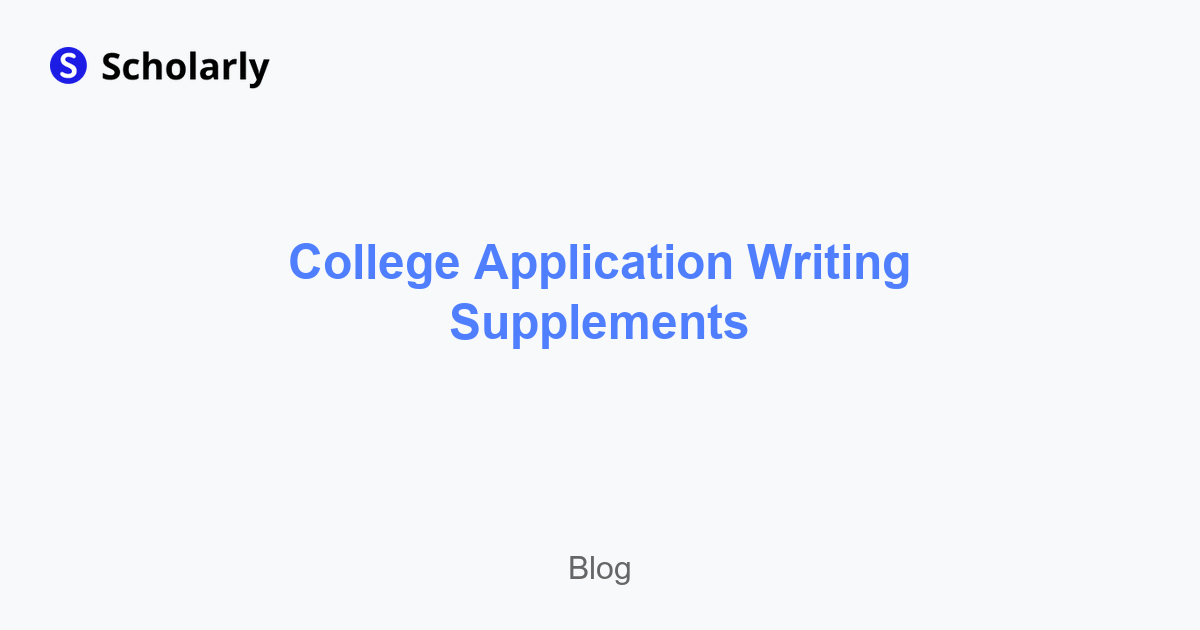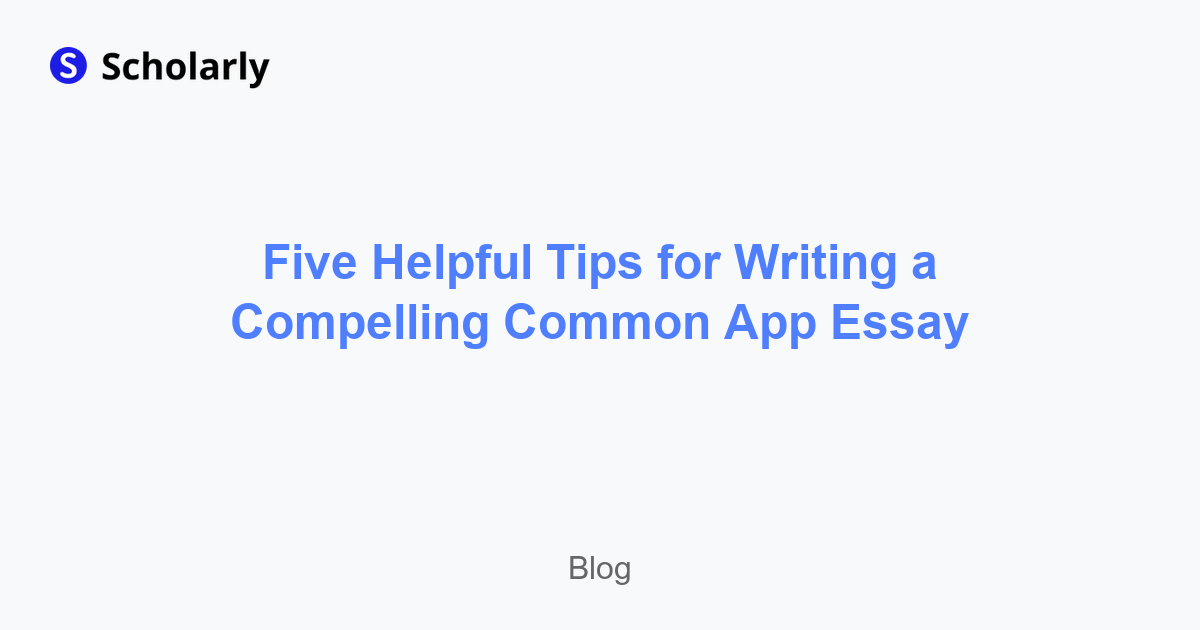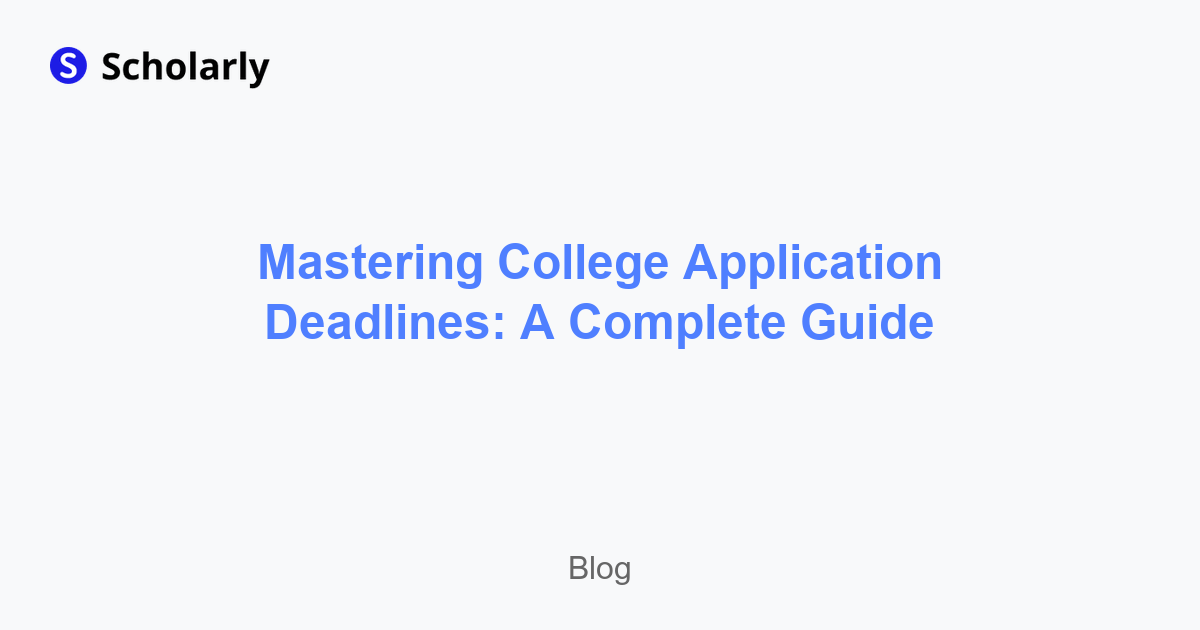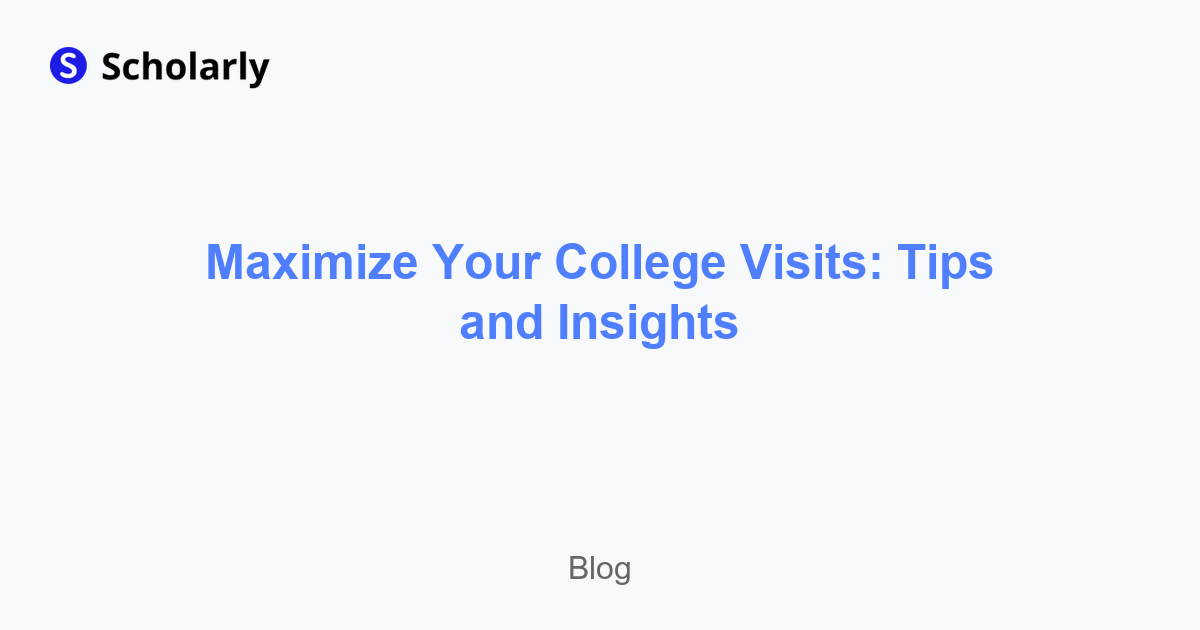Preparing for the Common App
The Common App opens August 1st. Here's everything you need to gather, prepare, and know before you start filling it out.
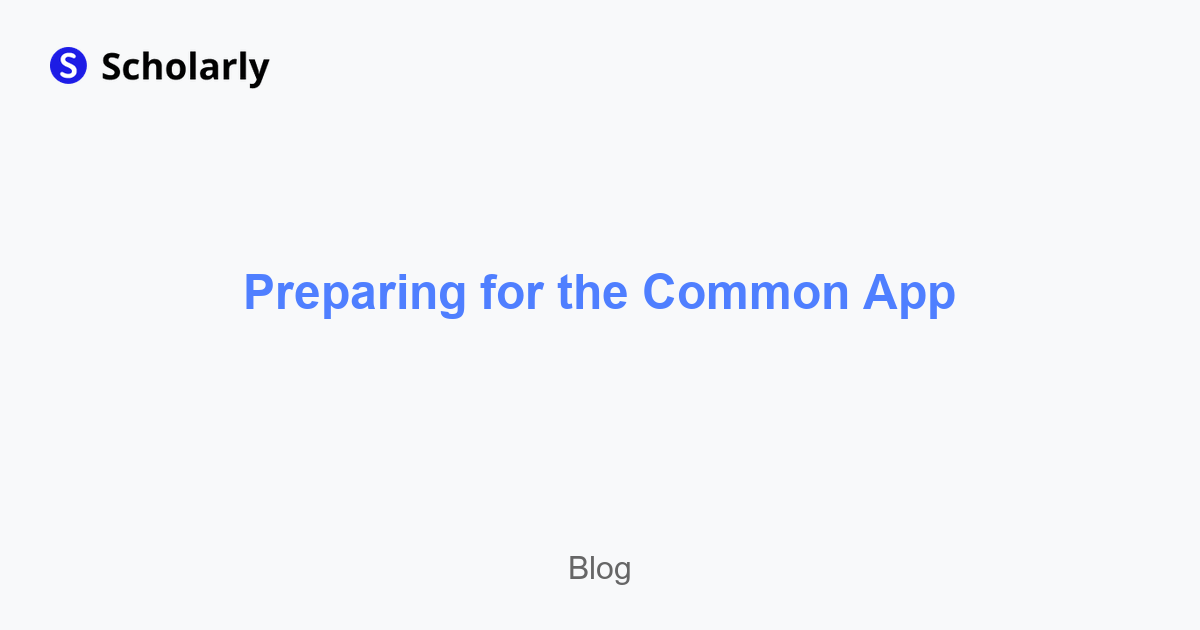
The Common Application is used by over 1,000 colleges and universities. Once you fill it out, you can send it to multiple schools, saving you the headache of completing separate applications for each college.
But filling out the Common App isn't something you should do in one sitting the night before the deadline. It requires preparation, organization, and thoughtful responses.
Here's exactly how to prepare for the Common App so you're ready when August 1st arrives.
What Is the Common App?
The Common Application is a standardized college application accepted by over 1,000 member colleges and universities.
Instead of filling out separate applications for Harvard, Northwestern, Duke, and 10 other schools, you fill out one application and send it to all of them.
You'll still need to:
- Write school-specific supplemental essays for most schools
- Pay application fees for each school (or request fee waivers)
- Submit additional materials specific to certain schools
But the core application biographical information, activities list, and personal essay are completed once and shared with all schools on your list.
When Does the Common App Open?
The Common Application for the 2025-2026 admissions cycle opens August 1, 2025.
This means:
- You can start filling it out on August 1st
- You cannot submit applications before August 1st
- Your application is not submitted until you click "Submit" for each individual school
Important: Opening the application and filling it out are different from submitting it. You can work on your Common App throughout August, September, and beyond. Most students don't submit until October (for Early Action/Early Decision) or December/January (for Regular Decision).
What You Need Before You Start
Don't open the Common App unprepared. Gather these materials first.
1. Personal Information
You'll need:
- Full legal name (as it appears on official documents)
- Date of birth
- Address, email, and phone number
- Social Security Number (optional, but required if you plan to apply for financial aid)
- Citizenship status
Tip: Double-check everything. Errors in personal information can delay processing or cause financial aid problems.
2. Family Information
Prepare details about:
- Parents' names, occupations, employment status, and education levels
- Where your parents went to college (if applicable)
- Siblings and their ages
- Your household size and family income range (for context, not required)
Why they ask: Colleges want to understand your background and whether you're a first-generation college student.
3. High School Information
You'll need:
- Official high school name and address
- High school CEEB/ACT code (ask your counselor)
- Dates of attendance
- Graduation date
- Your current courses and grades from 9th-12th grade (you'll self-report)
Important: You'll self-report your grades, but colleges will verify them with your official transcript later. Be accurate.
4. Standardized Test Scores (If Applicable)
Gather your:
- SAT scores (if you've taken it)
- ACT scores (if you've taken it)
- AP scores (optional to self-report)
- Any other standardized tests (SAT Subject Tests if taken before they were discontinued, etc.)
Self-reporting: You enter these yourself on the Common App. Official score reports are sent separately through College Board or ACT.
Test-optional note: Many schools are test-optional. You can choose whether to include scores for each school individually.
5. Activities List
This is the most time-consuming part of the Common App to prepare.
You can list up to 10 activities, including:
- Extracurricular activities
- Work experience
- Volunteer/community service
- Family responsibilities
- Summer programs or experiences
For each activity, you'll need:
- Activity name and type (from dropdown categories)
- Brief description (150 characters)
- Position/leadership role
- Grades participated (9th, 10th, 11th, 12th)
- Timing: When you participated (school year, break, all year)
- Hours per week and weeks per year
- Whether you plan to continue in college
Preparation tips:
- Create a spreadsheet listing all your activities
- Calculate hours per week and weeks per year for each
- Write 150-character descriptions highlighting impact and leadership
- Rank them by importance (you'll order them most to least significant)
6. Honors and Awards
You can list up to 5 honors or awards, including:
- Academic honors (Honor Roll, National Merit, etc.)
- Competition awards
- School-wide recognition
- Community awards
For each, you'll need:
- Honor name
- Level of recognition (school, state, national, international)
- Grade level when received
- Brief description
7. Personal Essay
The Common App requires one essay of 250-650 words (though 500-650 is ideal).
You'll choose from 7 prompts, but remember: the prompt matters less than your story.
Before starting the application, you should:
- Draft your essay
- Revise it multiple times
- Get feedback from teachers, counselors, or trusted adults
- Proofread carefully
Don't try to write this essay in the Common App interface. Write it in a document editor, perfect it, then copy and paste it in.
8. Letters of Recommendation
While you don't upload these yourself, you need to prepare for them.
Before starting your Common App:
- Identify which teachers you'll ask (typically two)
- Ask them in person or via email (ideally in spring of junior year, but early fall of senior year works)
- Provide them with a resume or brag sheet highlighting your accomplishments
- Follow your school's process for requesting letters
In the Common App, you'll:
- Enter your recommenders' names and email addresses
- The Common App will email them a link to upload their letters
Tip: Give teachers at least 3-4 weeks to write letters. Ask early.
9. School Counselor Information
You'll need your school counselor's:
- Name
- Email address
- Phone number
Your counselor will upload:
- Your official transcript
- School profile
- Counselor recommendation letter (if required by the colleges)
Coordination: Talk to your counselor early in the fall to make sure they know you're applying and what schools you're targeting.
10. Testing Information (Optional)
Some colleges require additional testing or information:
- TOEFL scores (for international students or non-native English speakers)
- Disciplinary history (if applicable)
- Fee waiver information (if you qualify)
How to Fill Out the Common App: Step-by-Step
Step 1: Create Your Account
Go to commonapp.org and create an account starting August 1st.
Use an email address you check regularly. All communication from colleges will go to this email.
Step 2: Add Colleges to Your List
In the "My Colleges" section, add the schools you're applying to.
For each school, you'll see:
- Application deadlines (Early Decision, Early Action, Regular Decision)
- Required supplemental materials (essays, portfolios, interviews)
- Application fee or fee waiver information
You don't have to add all your schools at once. You can add them as you finalize your college list.
Step 3: Complete the Profile Section
This includes:
- Personal information
- Family information
- Education (high school details, courses, grades)
Take your time here. Accuracy matters.
Step 4: Fill Out the Activities Section
Enter up to 10 activities in order of importance to you.
Strategies:
- Lead with your most significant activity (most time, leadership, impact)
- Use strong action verbs in descriptions ("Led," "Organized," "Founded," "Raised")
- Quantify impact where possible ("Raised $5,000," "Tutored 20 students")
- Don't repeat information—each activity should highlight something different
Step 5: Add Honors and Awards
List up to 5 honors or awards in order of significance.
Step 6: Write and Upload Your Personal Essay
Choose a prompt, write your essay (outside the Common App), then copy and paste it into the text box.
Before pasting:
- Proofread for typos and grammar errors
- Check that it's within the 250-650 word limit
- Read it out loud to catch awkward phrasing
Step 7: Assign Recommenders
Enter your teachers' and counselor's information.
The Common App will automatically send them invitation emails with instructions for uploading letters.
Follow up with your recommenders to make sure they received the email and plan to submit by your deadlines.
Step 8: Complete the Writing Supplement (School-Specific)
For each college, complete their supplemental essays and additional questions.
These vary by school. Some have one 250-word "Why Us?" essay. Others have 3-5 supplemental essays.
This is not shared between schools. You write separate supplements for each college.
Step 9: Review and Submit
Before submitting:
- Review every section for accuracy
- Proofread your essay one final time
- Check that all required sections are complete
- Pay the application fee or request a fee waiver
- Submit by the deadline
Important: The Common App doesn't automatically submit to all schools. You must submit to each school individually.
Common App Sections: What to Expect
Profile
- Personal data (name, address, contact info, demographics)
- Family information
- Education (high school, grades, courses)
Family
- Household information
- Parents' education and occupation
- Siblings
Education
- High schools attended
- Current year courses
- Grades from 9th-12th grade (self-reported)
- Class rank (if your school provides it)
Testing (Optional)
- SAT, ACT, AP, and other test scores (self-reported)
- Future test dates
Activities
- Extracurriculars, work, volunteer, family responsibilities
- Up to 10 activities
Writing
- Personal essay (one of seven prompts, 250-650 words)
Courses & Grades
- Current year courses
- Grades from previous years
Additional Information (Optional)
- Space to explain circumstances, provide context, or share information not covered elsewhere
Common App Timeline
August 1: Common App opens; start filling it out
September:
- Work on personal essay and activities list
- Request letters of recommendation
- Research supplemental essay requirements for each school
October:
- Finalize essays for Early Decision/Early Action schools
- Submit ED/EA applications by November 1 (or school-specific deadlines)
November-December:
- Continue working on Regular Decision supplements
- Finalize all applications
January:
- Submit Regular Decision applications (most deadlines are January 1-15)
Common Mistakes to Avoid
Mistake 1: Waiting until the last minute
Start early. Give yourself weeks, not days, to complete the application.
Mistake 2: Rushing through the activities section
This section requires thought. Don't just list activities—describe your impact and leadership.
Mistake 3: Writing your essay in the Common App interface
Write your essay in a document editor where you can save drafts and edit easily. Then copy and paste it into the Common App.
Mistake 4: Not proofreading
Typos and grammar errors undermine your application. Proofread everything multiple times.
Mistake 5: Forgetting to submit
Filling out the application is different from submitting it. Make sure you click "Submit" for each school before the deadline.
Mistake 6: Not tracking deadlines
Each school has different deadlines. Create a spreadsheet or calendar with all deadlines clearly marked.
Mistake 7: Leaving the "Additional Information" section blank when you should use it
If there are circumstances that affected your grades, family situations that impacted your activities, or other context that admissions officers should know, use the Additional Information section.
Fee Waivers
The Common App fee waiver covers application fees at all member schools.
You may qualify if:
- You receive free or reduced-price lunch
- Your family receives public assistance
- You live in federally subsidized housing
- Your family income falls below certain thresholds
- You qualify for a fee waiver for the SAT/ACT
How to request: Your school counselor will indicate on the Common App that you qualify for a fee waiver.
The Bottom Line
Preparing for the Common App means gathering information, drafting your essay, organizing your activities, and requesting recommendations before August 1st.
Once the application opens, you'll be ready to fill it out thoughtfully and thoroughly, rather than scrambling at the last minute.
Steps to prepare:
- Gather personal, family, and school information
- Create your activities list and calculate hours
- Draft and revise your personal essay
- Request letters of recommendation
- Research supplemental essay requirements for your schools
- Create a deadline tracker
Start preparing now, so when the Common App opens, you're ready to submit strong applications to all your schools.
Ready to Strengthen Your Application?
The Common App is just one part of your college admissions process. Make sure your academics are strong too.
Scholarly helps you retain what you study, so you can maintain the strong GPA that makes your Common App stand out.
Prepare early. Apply strong. Get accepted.
Try Our Popular AI Study Tools
Transform your study materials into interactive learning experiences with our most popular AI-powered tools:
PDF to Flashcards
Convert lecture notes and textbooks into study flashcards instantly
Text to Flashcards
Turn any text or notes into comprehensive flashcard sets
Image to Flashcards
Convert diagrams and handwritten notes into digital flashcards
YouTube to Flashcards
Generate flashcards from educational video content
